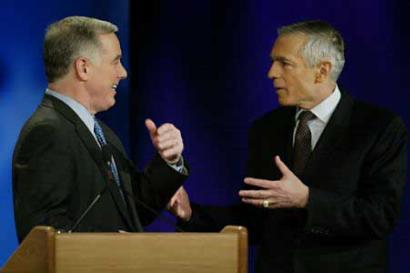Thursday and Friday’s screenings made ten movies in five days. This was drastic media input by all reasonable standards, particularly given the four hours of sleep I was getting, the writing I was trying to get in, and the day job. By the end of Friday, I actually believed John Garfield and Liz Scott were inviting me to dinner to discuss a few double-cross angles over poisoned cabarnet — in today’s world, their schemings would probably be articulated in a marketing plan. Fortunately, a few friends stepped in at the right moment, delineating the differences between film and reality. They threatened never to speak to me again if I kept spending so much time at the Castro Theatre, whether solo or with other folks. Every obsession has its price. I learned this from film noir.
Movie blurred into movie. It was getting more difficult to judge each film on its own merits or lack thereof. Titles, directors, and actors were thrown into a mental cistern and memory required careful auditing. But now with sleep and time away from the screen, it is, at last, possible to dwell upon what I saw.
The Accused (1949): I’m not quite sure how much Jonathan Kaplan’s 1988 movie, an overrated piece of tripe that seemed to revel in its depiction of rape, had to do with this forerunner. The Kaplan version doesn’t have a source. What I do know is that both movies involve a woman who gets raped, an attorney who attempts to defend them, and some Hester Prynne-like stigma felt internally by the victims. Despite its intentions, beneath the surface, the Kaplan film went with Jodie Foster as the blue-collar pottymouth type who had it coming, “sexing up” the rape through an unnecessary flashback masquerading under the imprimatur of docudrama. But the 1949 version turned out to be smarter and more fascinating, even if it culminated in a disappointing finale that betrayed its intentions.
Loretta Young plays a psychology professor (in a 1949 film, no less!) who gets a ride from a student hoping to get into her pants. The student, fond of suggestively chomping down on pencils in the classroom, takes her on an extended ride, strips down to swimming trunks, and then tries to assault Young over a cliff face. Young beats him to death in self-defense and spends most of the movie dodging the scientific-minded detectives (who also toss around rough gender role generalizations) looking into the case, while rearranging her appearance when necessary.
The film’s first hour is its most fascinating. We see Young trying to convince an exchange student that college is a waste of money if a lady goes there solely to snag a husband. There’s the suggestion in this moment, which isn’t particularly didactic, that the film will be about the crumbling of a woman’s image. There’s a running undercurrent in the film’s dialogue and visuals on how people are judged by their looks. There’s a shot of Young looking into a compact as a man who may be able to identify her can be seen in the reflection. It’s a canny bon mot which implies that Young may also a victim of how society judges men and women in the smallest of ways. This is also reflected by the smoking gun pinning the case to Young: a blown-up display of a slide sample in a dark room.
Unfortunately, the film abandons this angle and turns Young into yet another hopeless spinster who needs a man. She swoons over Robert “We’ll win this war if the cows come home” Cummings, and apologizes for “a spinster’s kiss.”
It should be noted that The Accused was written by a woman, Ketti Frings. I couldn’t help but wonder whether Frings had to settle for the sickening transition into “woe is me” histrionics (or, for that matter, Young’s lame first-person voiceover, reinforcing the fearful woman racket) to get the early points across. I was very disappointed by the end. But for a 1949 film, it still managed to sneak in a few interesting assaults on gender relations.
The Reckless Moment (1949): The film, one of only two movies that the great Max Ophuls made in Hollywood, is based on the same source material as 2001’s The Deep End. I’d seen that film, which was propelled more by Tilda Swinton’s extraordinary performance than its passable script. But I didn’t realize how much directors Scott McGehee and David Siegel had appropriated Ophuls’ imagery. The 1949 version has the great Joan Bennett in the role of the mother doing whatever it takes to keep a murder on the q.t. Bennett has an altogether different desperation than Swinton. Where Swinton is the independent type, Bennett covers up the crime with a good deal of help from servants. While both ladies are competent protectors and not to be messed with, Bennett comes across better as the indomitable commander. But that’s largely because The Reckless Moment‘s script is better.
Other than this, the narrative distinctions between the two films stop. James Mason attempts an Irish dialect, but, alas, his is the voice of James Mason. Before you can say Humbert Humbert or Bigger than Life, he’s simpering on all fours in the way he does so well.
If I had to pick one movie or the other, I’d base my choice on one simple criterion. The Reckless Moment is 82 minutes long. The Deep End is 101 minutes. The Reckless Moment wins by way of its breeziness.
Desert Fury (1947): Desert Fury was one of two Technicolor noirs Mueller programmed. And, oh, what wonderful subtext in the Robert Rossen script.
The film stars Liz Scott, who, not long ago, I confessed my relentless devotion to (and, apparently, I’m not alone). Desert Fury is worth it just to see the lovely Ms. Scott filmed in beautiful Technicolor. I found myself blushing throughout the film. My able viewership was helped by the art department. If I had to offer a conservative estimate on the number of costume changes for Ms. Scott, it would stand somewhere around 204.
I confess these details not to run a film freak’s Vespa into a brick wall, but because, in light of the subtext, it’s necessary to point out that Liz Scott is nothing less than stunning, beautiful, sharp, a young lady who declares early on that she has no problem “playing with matches,” a woman who any man would go to jail over. And not the way you’re thinking.
Now the subtext: John Hodiak plays a gangster who has arrived at a Nevada desert town with his, uh, special male companion Wendell Corey. Corey has apparently been everywhere with Hodiak for quite some time. As Hodiak himself confesses, Corey bought him “ham and eggs” when they first met. And we all know what that means.
Hodiak is in a bit of denial about his, uh, relationship with Corey. He hopes to go off with Scott. But he tried the same thing earlier with Scott’s mother (played with snap and grace by Mary Astor). And Corey came along to the picnic then.
Now, as established above, any man would run off with Scott in a minute. And this is where Scott’s casting is crucial. She encourages Hodiak to run off with her. And he still can’t shake Corey. To the point where Hodiak’s conflicted through the film and snaps with a cruel act towards a local (and much more after) in a diner.
And then there’s Burt Lancaster, the deputy whose tousled hair looks gayer than Hodiak and Corey combnied. He has his eyes on Scott too. But Scott isn’t quite convinced he’s the rugged man who will take her away.
It is to the immense credit of Rossen and director Lewis Allen that they got away with so much mangled manhood at the time that this was made. Where The Accused abandoned its subtext early on, Rossen is a gifted enough writer to stay with it until the bitter end. I came down a bit hard on Rossen with The Strange Love of Martha Ivers, but where the dialogue of that film appeared dictated by a writer’s efforts to prove he was one with the atmosphere dammit and that he’s lived, Rossen is able to pull off a stylized Nevada vernacular here that, along with the subtext, makes Desert Fury a juicy, overlooked gem.
Leave Her to Heaven (1945): Like the 1948 version of The Postman Always Rings Twice, I was underwhelmed by this purpoted classic. Perhaps I was distracted by Gene Tierney and Cornel Wilde’s preternaturally perfect eyebrows. Or maybe I was hoping for more motivation into Tierney’s character. Or maybe I was just damned annoyed by director John M. Stahl’s stilted framings, the blocking of which resembled a really bad community theatre production. Or maybe I was vexed by the dimebag courtroom finale with the over-the-top prosecutor and the endless yeses. Or maybe I simply wanted to slap Wilde around because he had all the thespic range of a Mylar board.
With the exception of nice perspective shots during one murder sequence, I just couldn’t believe in this movie. But this was, after all, Number 10.





